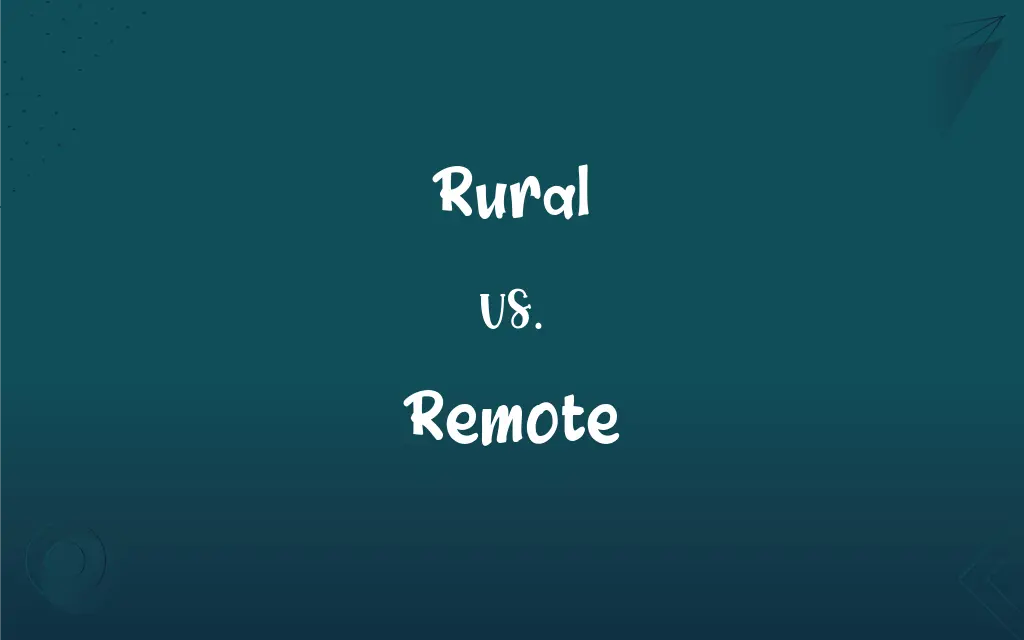Rural vs. Remote: What's the Difference?
Edited by Harlon Moss || By Janet White || Updated on November 17, 2023
Rural areas are less populated and less urbanized, while remote areas are isolated and harder to access.

Key Differences
Rural areas primarily reference regions that are not urban, marked by lower population densities and fewer built structures. Remote, however, describes locations that are distant or hard to reach, often due to geographical challenges.
In terms of accessibility, rural locations might still be relatively accessible with clear routes or roads connecting them to urban centers. Remote areas often lack convenient transportation links and can be challenging to reach.
It's essential to recognize that while all remote regions can be rural due to their isolation, not all rural areas are remote. Some rural regions might be just outside urban territories, making them accessible but less developed.
Rural regions often still maintain some level of infrastructure, like schools, healthcare facilities, or markets, though less densely spread. Remote regions, due to their isolation, might lack many of these amenities.
The lifestyles in rural areas often revolve around agriculture or local trades. In remote regions, lifestyles might be significantly adapted to the challenges posed by isolation, such as limited resources or unique geographical features.
ADVERTISEMENT
Comparison Chart
Characterization
Less populated and urbanized.
Distant and hard to access.
Accessibility
May still be relatively accessible.
Often lacks convenient transportation links.
Infrastructure
Contains some infrastructure, but less than urban areas.
Might lack many amenities due to isolation.
Relation to Urban Areas
Can be close to urban regions but less developed.
Not defined by proximity to urban areas but by isolation.
Lifestyle
Often centered around agriculture or local trades.
Adapted to challenges of isolation.
ADVERTISEMENT
Rural and Remote Definitions
Rural
Not urban or metropolitan.
Despite its proximity to the city, the village retained its rural charm.
Remote
Difficult to access or reach.
The remote island was untouched by modern civilization.
Rural
Denoting the simple, country style of life or manners.
His rural upbringing was evident in his love for nature.
Remote
Having minimal connection or relevance.
The idea seemed remote from the main topic of discussion.
Rural
Pertaining to the countryside rather than the city.
He moved from the bustling city to a calm rural town.
Remote
Distanced in relation or connection.
He felt remote from his colleagues after the disagreement.
Rural
Characterized by agriculture, farming, or pastoral settings.
The rural landscape was dotted with farms and grazing cattle.
Remote
Located far away; distant in space.
Rural
Relating to areas with fewer inhabitants and less development.
She loved the peace and serenity of her rural home.
Remote
Hidden away; secluded
A remote hamlet.
Rural
Of, relating to, or characteristic of the country.
Remote
Distant in time
The remote past.
Rural
Of or relating to people who live in the country
Rural households.
Remote
Faint; slight
A remote possibility.
Had not the remotest interest.
Rural
Of or relating to farming; agricultural.
Remote
Far removed in connection or relevance
A cause remote from everyday concerns.
Rural
Relating to the countryside or to agriculture.
Remote
Distantly related by blood or marriage
A remote cousin.
Rural
(obsolete) A person from the countryside; a rustic.
Remote
Distant in manner; aloof.
Rural
Of or pertaining to the country, as distinguished from a city or town; living in the country; suitable for, or resembling, the country; rustic; as, rural scenes; a rural prospect.
Here is a rural fellow; . . . He brings you figs.
Remote
Operating or controlled from a distance
Remote sensors.
Rural
Of or pertaining to agriculture; as, rural economy.
We turnTo where the silver Thames first rural grows.
Lay bashfulness, that rustic virtue, by;To manly confidence thy throughts apply.
Remote
(Computers) Located at a distance from another computer that is accessible by cables or other communications links
A remote terminal.
Rural
Living in or characteristic of farming or country life;
Rural people
Large rural households
Unpaved rural roads
An economy that is basically rural
Remote
A radio or television broadcast originating from a point outside a studio.
Rural
Relating to rural areas;
Rural electrification
Rural free delivery (RFD)
Remote
A remote control device.
Remote
At a distance; disconnected.
A remote operator may control the vehicle with a wireless handset.
Remote workers
Remote
Distant or otherwise inaccessible.
After his fall from the emperor's favor, the general was posted to a remote outpost.
Remote
(especially with respect to likelihood) Slight.
There was only a remote possibility that we would be rescued as we were far outside of the regular shipping lanes.
They have a very remote chance of winning.
You have a remote resemblance to my grandmother.
Remote
Emotionally detached.
After her mother's death, my friend grew remote for a time while she dealt with her grief.
Remote
Ellipsis of remote control
I hate it when my uncle comes over to visit; he always sits in the best chair and hogs the remote.
Remote
(broadcasting) An element of broadcast programming originating away from the station's or show's control room.
Remote
(computing) To connect to a computer from a remote location.
Remote
Removed to a distance; not near; far away; distant; - said in respect to time or to place; as, remote ages; remote lands.
Places remote enough are in Bohemia.
Remote from men, with God he passed his days.
Remote
Hence, removed; not agreeing, according, or being related; - in various figurative uses.
Remote
Separated by intervals greater than usual.
Remote
A device that can be used to control a machine or apparatus from a distance;
He lost the remote for his TV
Remote
Far distant in space;
Distant lands
Remote stars
A remote outpost of civilization
A hideaway far removed from towns and cities
Remote
Very unlikely;
An outside chance
A remote possibility
A remote contingency
Remote
Far distant in time;
Distant events
The remote past or future
A civilization ten centuries removed from modern times
Remote
Inaccessible and sparsely populated
Remote
Far apart in nature;
Considerations entirely removed (or remote) from politics
Remote
Operating from a distance; not directly connected.
She used a remote control to switch off the television.
FAQs
What does rural mean?
Rural refers to areas that are characterized by the countryside, fewer inhabitants, and less development than cities.
Are rural areas always far from cities?
Not necessarily. Some rural areas can be just outside urban territories but are less developed.
Can a place be both rural and remote?
Yes, a location can be both rural in character and remote in its accessibility.
What makes an area remote in terms of accessibility?
An area's isolation, lack of convenient transportation, or challenging geographical features can make it remote.
How does lifestyle differ between rural and urban areas?
Rural lifestyles often revolve around agriculture, local trades, or community-centered activities, while urban lifestyles are more fast-paced with diverse professions.
How is remote defined?
Remote describes locations that are distant, hard to access, or isolated from main regions.
What challenges do remote areas face?
Remote areas often face challenges like limited resources, access to healthcare, education, and communication barriers.
Why are some areas considered remote?
Areas might be remote due to geographical challenges, lack of transportation links, or significant distance from populated regions.
Can rural areas be developed without losing their essence?
Yes, with sustainable and community-centered development, rural areas can progress while retaining their unique character.
Do rural areas lack modern amenities?
Not always. While rural areas might have fewer amenities than urban ones, many still maintain essential services and infrastructure.
Are all remote areas also rural?
Generally, yes. Due to their isolation, remote areas are often rural in character.
Are remote areas untouched by modern civilization?
Not always. While many remote areas remain untouched, some might have been influenced by external factors like tourism or research activities.
How does infrastructure in rural areas compare to urban ones?
Rural areas generally have less infrastructure and amenities compared to urban areas, but this varies based on the region and country.
Do rural areas contribute significantly to economies?
Absolutely. Rural areas, especially through agriculture, can be vital to national and local economies.
How are remote locations identified on maps?
Remote locations might be identified by their significant distance from urban centers, challenging terrains, or lack of major roads.
Can remote areas have technological advancements?
Yes. Some remote areas might have technological tools or communication means, especially if necessary for survival or work.
Why do people choose to live in rural areas?
Many choose rural living for its serenity, closeness to nature, affordability, or cultural and family ties.
Are remote regions less populated?
Generally, remote areas tend to have fewer inhabitants due to their isolation and limited resources.
About Author
Written by
Janet WhiteJanet White has been an esteemed writer and blogger for Difference Wiki. Holding a Master's degree in Science and Medical Journalism from the prestigious Boston University, she has consistently demonstrated her expertise and passion for her field. When she's not immersed in her work, Janet relishes her time exercising, delving into a good book, and cherishing moments with friends and family.
Edited by
Harlon MossHarlon is a seasoned quality moderator and accomplished content writer for Difference Wiki. An alumnus of the prestigious University of California, he earned his degree in Computer Science. Leveraging his academic background, Harlon brings a meticulous and informed perspective to his work, ensuring content accuracy and excellence.






































































